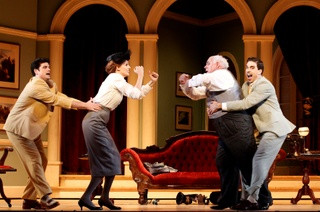|
Back
As zesty as a lemon gelato Melbourne
State Theatre
11/19/2014 - & November 22*, 25, 29, and December 3, 6, 12, 2014
Gaetano Donizetti: Don Pasquale
Conal Coad (Don Pasquale), Rachelle Durkin (Norina), John Longmuir (Ernesto), Samuel Dundas (Dr Malatesta), Benjamin Rasheed (Notary)
Orchestra Victoria, Opera Australia Chorus, Guillaume Tourniaire (Conductor)
Roger Hodgman (Director), Richard Roberts (Set & Costume Designer), Matt Scott (Lighting Designer)

(Courtesy of Opera Australia)
Following its Sydney debut, Director Roger Hodgman’s brilliantly coloured production of Don Pasquale is Opera Australia’s second offering in this Melbourne Spring Season. Inspired by William Wylder’s Roman Holiday, the action is set in Rome during the 1950’s. As in the movie, ambiance is everything and much effort is made to capture colours, scenes and styles of the period. From terracotta exteriors, a street café and a Vespa motorcycle to mint green interiors, the colours of Italy are dominant features of the show. In the final act, the décor is so successful I was certain that I could smell the jasmine on the garden walls as moonlight spread soft shadows and the distant sky darkened.
New Zealand basso Conal Coad is a master of the buffo and Australian soprano Rachelle Durkin is a wily and confident Norina. Together, they are completely hilarious; playing the action for every joke including designer Richard Roberts’ allocation of a toupee to the Don which he convinces himself makes him look younger. Needless to say, it slides off, is rearranged back-to-front, lands in the lap of Norina who regards it as some kind of noxious vermin, and is eventually hidden down the back of the sofa. All this supplements the inherently silly plot and makes it all the more ridiculous. Together these protagonists are a delight with the audience roaring in laughter throughout.
As the Don, Mr Coad’s voice is ideal. Rich and hearty, it plumbs impossible depths and yet remains flexible enough to deliver the Act 3 patter song with Malatesta at a rapidfire pace never once losing clarity of diction or pitch. He is a brilliant comic without overstating the buffo elements of the role. Quite the opposite, his interpretation is such that we see elements of pathos as the old man endeavours to stave off the loneliness of old age. There are moments of poignancy in this production which speak of another side to the laughing buffoon; sometimes quite sad and always endearing.
Rachelle Durkin’s Norina is assured and sassy. She is as much the tormentor as the seductress and revels in the opportunity to give the rich old curmudgeon his come-uppance. Her strong voice has a ringing brilliance filling the massive State Theatre. Her stage presence is perfect for this type of role: a “knockabout” comédienne who dances, pouts and hurls herself into the play-acting in an infectious and captivating manner. Her solos displayed great agility of voice and variety of texture but it was the ensembles which showed her adaptability and impeccable sense of timing. She varied timbre and power to perfectly adjust her dark-toned voice to the lighter-voiced John Longmuir as Ernesto. The result was a gorgeous duet and similarly impressive scenes with the other soloists.
Australian tenor John Longmuir has the looks and demeanour to portray the young lover convincingly. His voice is bright and brilliant which is excellent for the solos but was occasionally lost in the more boisterous passages particularly in Act 1. Nevertheless, he threw himself into the silliness and gave a creditable performance which earned a good many laughs and strong acclamation from the audience.
As Dr Malatesta, Australian baritone Samuel Dundas shone. His commanding voice accurately and flamboyantly captured the showiness of the character. He, too, gave wonderful solos but it was in the context of the ensembles he really demonstrated an appreciation of the fine balance required to make this opera work in performance. He matched Rachelle Durkin’s physicality and brought a roguishly suave and stylish presentation to the role.
Returning to Opera Australia after successful seasons since 2010, French conductor Guillaume Tourniaire again brought his perfect timing and variability to the pit. Orchestra Victoria sounded good overall despite some early passages where the woodwind and brass were less than clear. Mr Tourniaire read the score somewhat slowly in early passages but then took off at a roaring pace in others. This was a performance of changing shades of sound best exemplified by the presence onstage of the solo trumpet accompanying Ernesto’s Act 2 lament. The instrumentalist appeared as a busker under a street lamp adding greatly to the atmosphere of the set. Mr Tourniaire maintained control over this potentially difficult staging to produce a lush, lilting sound perfectly complimenting John Longmuir’s voice.
This production is full of delightful details: a little café outside Don Pasquale’s villa; a couple of mafia types who drink endless espressos while scrutinising the goings-on; happy tourists posing for “holiday snaps”; Ernesto’s pale blue Vespa; and the chorus who are transformed into household servants under Norina’s direction. Roger Hodgman has caught some of the flamboyance of the movie in these tiny elements of stage action. There is always some element adding to the plot and inevitably milking it for another laugh. Most notable being the delivery to Ernesto of his Teddy bear by a maid as he sits alone and forlorn outside his former residence.
This opera is an extended ensemble piece with occasional solos. Donizetti’s exquisite score is rendered delicately and meticulously by the cast and orchestra without limiting the opportunities for laughs.
Gregory Pritchard
|